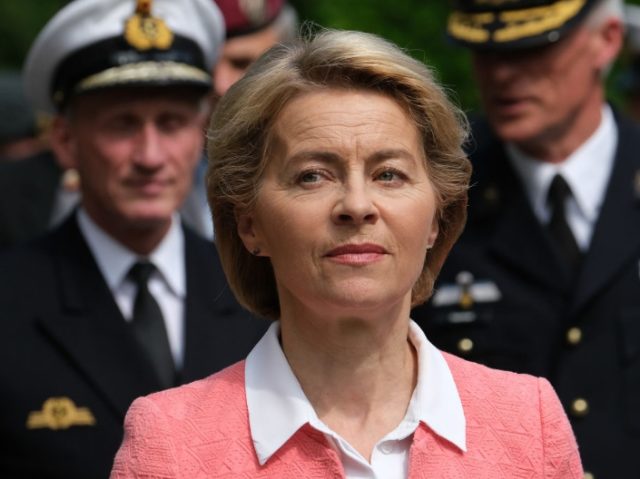STRASBOURG, France — Long-serving German defence minister Ursula von der Leyen, a key ally of Chancellor Angela Merkel and proponent of European military integration has emerged as the favoured candidate to become the next President of the European Commission — one of the top jobs in the European Union.
Ursula von der Leyen, who was recently considered a candidate to replace Angela Merkel as German Chancellor and who grabbed headlines in 2017 for appearing to lecture Donald Trump over his language could be the next leader of the European Commission.
Present European Council leader Donald Tusk — himself about to be replaced as the European Parliament enters a new five-year term — announced the selection of German defence minister Ursula von der Leyen as the preferred candidate of the Council Tuesday evening. She and other key candidates, including the head of the globalist, pro-mass migration International Monetary Fund Christine Lagarde who has been put forward as the next head of the European Central Bank, will now be submitted to the European Parliament for approval in a majority vote.
The Brexit Party’s John Longworth, Member of the European Parliament and one of the 751 MEPs who will soon be voting on whether to accept the candidate told Breitbart London of the selection: “Why should someone no one ever heard of, with few significant achievements be appointed in charge of the European Commission, an unelected organisation with the sole right to initiate EU law. Another classic EU stitch-up.”
The selection process has already featured several marathon deadlocked negotiation sessions between European leaders in Brussels, who have gone through a series of compromise candidates including most recently left-wing “dangerous fanatic” Frans Timmermans, who was assumed to be the favourite. He was supplanted by von der Leyen Tuesday after a group of nations in central Europe insisted against having a candidate on the left of the European political spectrum.
While those nations may treat von der Leyen as a small victory, she is still to the left of even Chancellor Angela Merkel of Germany and appears to be a believer in the European federalisation project. Nonetheless, the selection came as a surprise in the European Parliaments.
As part of the ongoing selection process, members of the European Parliament — of which the Brexit Party is now the largest — will likely consider Ursula von der Leyen’s increasingly difficult tenure as German defence minister. She criticised President Trump for Eurosceptic language in 2017, and appeared to be one of many who misjudged the President’s approach to NATO as ill-founded.
In fact, since Trump’s hardline approach to malingering NATO members — of which Germany is perhaps one of the most obvious case — the performance of member states has picked up pace.
As for the German military, Politico reported “a cloud of allegations of misspending and mismanagement” over military contracts as news of her selection broke on Tuesday.
Also notable is von der Leyen’s track record on military integration in Europe, a deeply controversial topic which is perceived to have been one of the key topics which pushed the British people towards voting to leave the continental bloc in 2016. Von der Leyen warned the United Kingdom against daring to oppose further military federalisation — moving towards a single EU army, navy and air force — in 2016 and this year bragged that the EU army was “already taking shape”.
“Germany and France are the driving forces in defence,” von der Leyen wrote in January, adding that “We’re moving even further ahead with our close partner France” after the two countries agreed to sign a “new Elysèe Treaty” which moved towards merging common defence.
“Our stated goal is for European nations to speak with a co-ordinated voice in the United Nations. Germany has just started a two-year stint as a non-permanent member alongside France on the UN Security Council. That strengthens Europe’s voice in the concert of world powers,” she added.

COMMENTS
Please let us know if you're having issues with commenting.